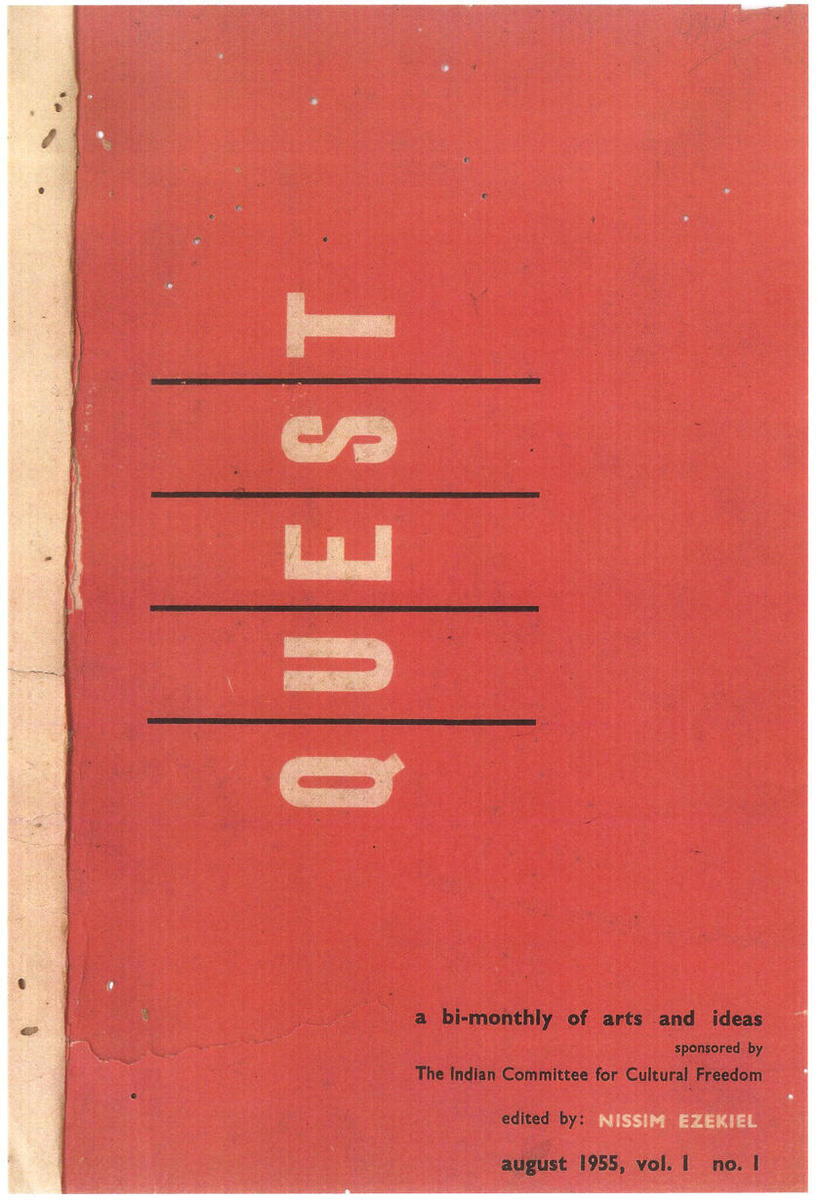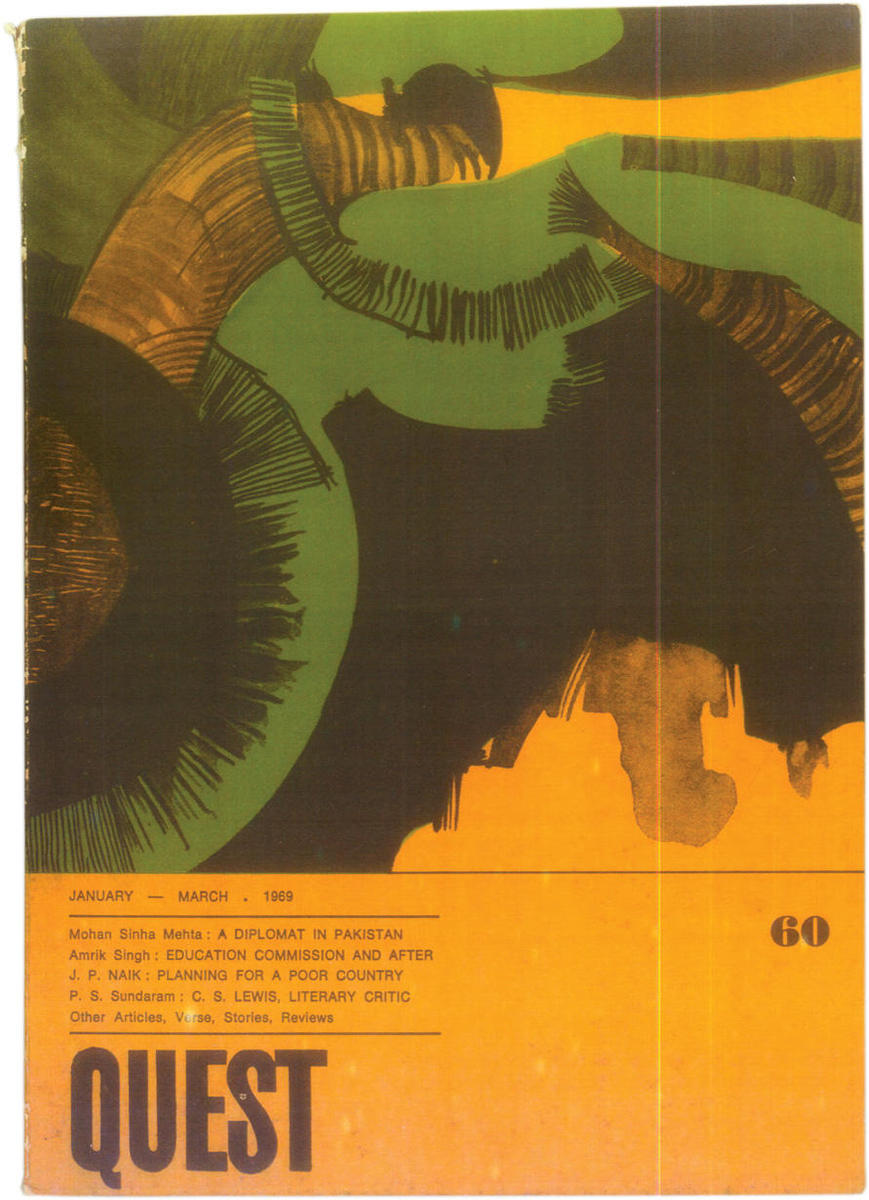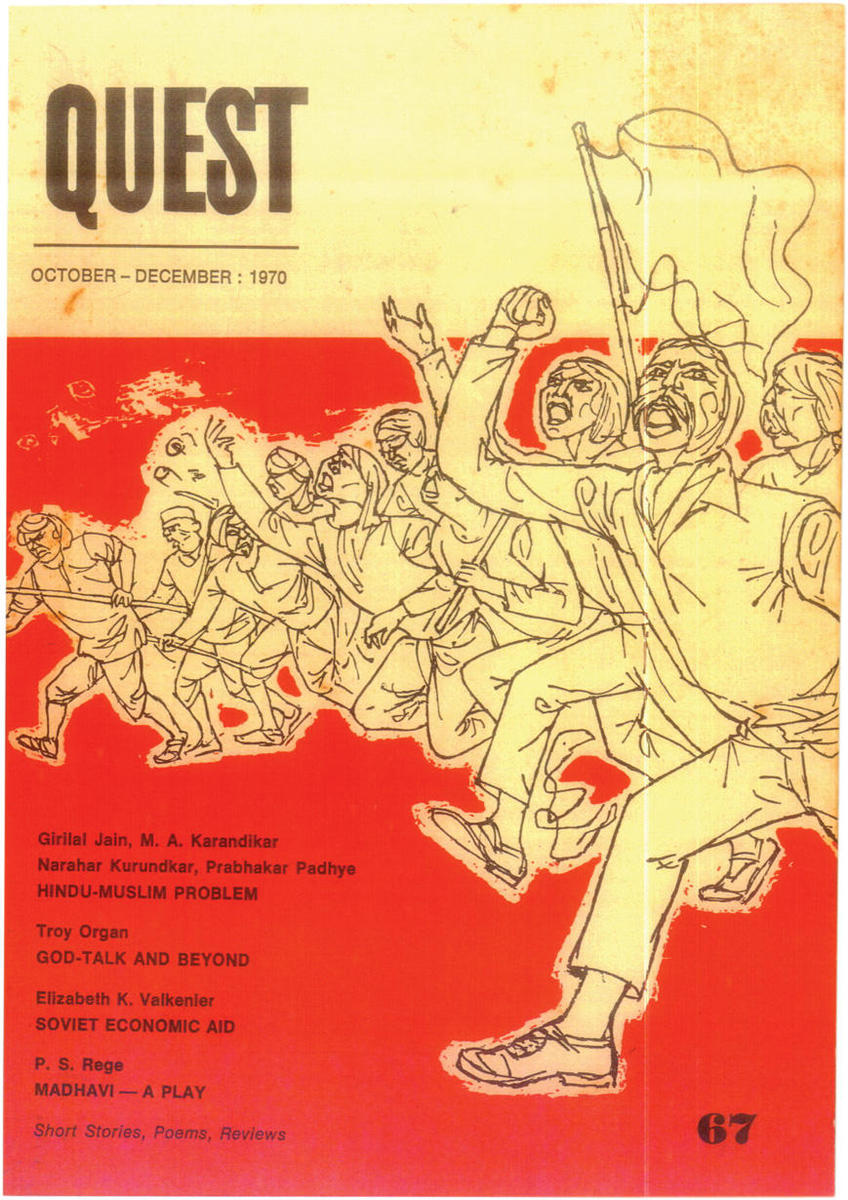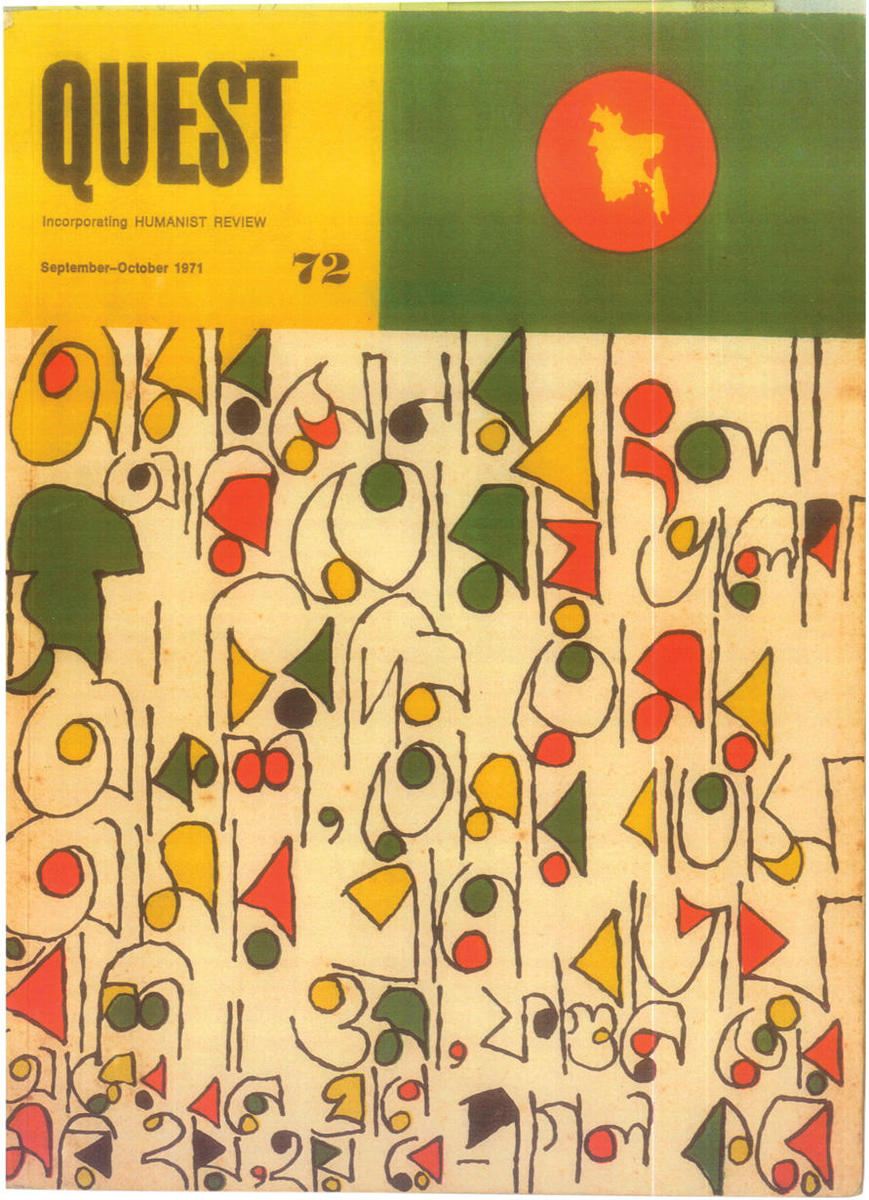
In his brief introduction to The Best of Quest, a 660-page brick of a book collecting scores of essays, poems, and stories from what was once India’s leading English-language literary journal, Achal Prabhala relates the chance encounter that led to the anthology’s conception. Like many such encounters, it happened in bed. Sleepless and bored, he turned to a pile of magazines his parents had given him and plucked out an issue at random. It was the April–June 1970 Quest, and there was an essay inside like a message in a bottle… a bottle stuffed with an oily rag, set on fire, and sent spinning nearly four decades into the future. At his head.
He got out of bed.
“The Coffee-Brown Boy Looks at the Black Boy” was a meditation on race and color, democracy and jazz, the shame of being alive, the shame of being Indian, the dead-end choice between the Soviets and the Americans. It was sharp, scurrilous, incantatory, sexualized, self-loathing, other-loathing; pathetic, bathetic, balletic. Its universe of references — Iris Murdoch, the Mahabharata, Blind Lemon Jefferson, Jawaharlal Nehru, WEB Du Bois, William Faulkner, Ornette Coleman, Herbert Marcuse, and (especially) James Baldwin — and the bravado with which that universe was breathed into existence, thrilled and dislocated him. “After the first sentence, I wanted to hug him,” Prabhala wrote. “By the end of the essay, I wanted to be him.” Except that the author of this magisterial vortex of an essay, one JS Saxena, seemed never to have written another word, before or after.
It’s hard to imagine a coincidence of prose and circumstance more likely to excite Prabhala, a Jesuit-trained writer and intellectual property activist from Bangalore who has lived and worked in Guyana, South Africa, and the United States. As it happened, he was deep in the planning stages of “Everybody Has Their Indian,” a special issue of the Capetown-based journal Chimurenga on South Asians and Africa. He promptly slated “The Coffee-Brown Boy” for reprinting. But he also set off on his own journey, to find out what this Quest was to have published such a thing. And what was it doing in his parents’ library?
It turned out that Quest was not unlike that Saxena essay — strange, delightful, controversial, and mostly forgotten. Founded in 1955 by Nissim Ezekiel, a young modernist poet from an old Bombay Jewish family, Quest had, over the course of its hundred and one issues, launched several generations of Indian writers working in English, published travel writing and memoirs, lampooned American seekers on the hippie trail, and published poems by Allen Ginsberg. Prabhala reached out to Arshia Satter, a translator, scholar, and filmmaker with a personal connection to the journal, and the two of them vowed to assemble a reader. Early on, both were struck by the number of Muslims, Christians, and southerners among Quest’s list of contributors. They were equally surprised to discover that the contributions of Quest’s Muslim writers were often just this side of Ayaan Hirsi Ali.
The story of Quest had all that — and a terrible secret at its heart. In 1967, the New York Times reported that the Congress of Cultural Freedom (CCF), a Paris-based “unofficial, voluntary organization of free men bound together by their devotion to the cause of freedom” that served as a kind of international endowment for the arts, had been founded, and oft-funded, by the American Central Intelligence Organization (CIA). The CCF had sponsored magazines, theater groups, writers’ clubs, orchestras, art exhibitions, conferences, and cultural exchanges across the globe; Quest was one of these. Transition, an African magazine in the CCF’s orbit, was another. That journal was already quite well known to Prabhala — one of his first essays, on coffee-brown boys looking at black boys, more or less, had appeared in Transition’s American revival in 2006. (Disclosure: I was the editor of Transition at the time.) The original Transition had been shut down by the Ugandan government in the wake of the CIA scandal; in London, the poet Stephen Spender had resigned as editor of Encounter, the CCF’s flagship journal. But Quest had survived that storm. It was another storm — Hurricane Indira — that had shuttered Quest for good, in 1976, amid the declaration of martial law and the state of emergency.
The Best of Quest can be slightly maddening, with its mostly but not entirely chronological organization, its lack of contributors’ notes, the glaring absence of an index. But this is quibbling. (And, supposedly, slated for improvement: the book sold out of its first print run even before its official launch, and the second printing will have more apparatus, Prabhala assures me.) But it is a pleasure to read, literally packed with obscure yet fascinating debates, impeccably edited prose, and not a few surprises. Like Satyajit Ray’s illustrations of the erotic sculptures at Konark, or the mysterious Mister Saxena and his message in a Molotov cocktail.
Over several weeks, Prabhala and I sat down for a series of Skype conversations to talk about Quest and the CCF and cold war cultural diplomacy.

Michael Vazquez: So as I understand it, the story of Quest begins with the General Secretary of the Congress for Cultural Freedom wandering the cities and towns of India, looking for an editor. What, precisely, was he there for? What was the point of Quest?
Achal Prabhala: I think it depends. For the CCF, it seems fairly obvious. By the 1950s Nehru was clearly socialist. And the communists had been strong in India from long before independence. And this was not long after Mao’s triumph in China. So from the CCF point of view, there was a sense that if the right people could be found, India was a place where something needed to be done. But I think from the Indian point of view, there would have been a real desire on the part of people like Nissim Ezekiel, the founding editor, to have a modern Western-style publication that would be a home for literary writing. I imagine that he saw it, frankly, as a chance to start something that looked like Encounter. The people involved with Quest were the sort of people whose main experience with literature would have been outside the country. So I imagine that it would have been an attractive proposition to get money to start up something that brought that side of the world here.
MV: In Peter Coleman’s book The Liberal Conspiracy, he narrates how Nissim got the nod as editor in part because he had a clear idea about what the magazine should be — and maybe the idea for the title, too? It would be a “mouthpiece” for Indian writers not published abroad, and it would be “a bulwark against further deterioration of the English tongue,” which was already “appalling.” I love that detail. What a fine argument for a magazine. There are other quotes in Coleman’s book that describe the sheer willfulness of Quest’s project, as an English-language literary magazine in this epically large country where almost no one speaks English, and where the people who do speak it have almost nothing but condescension for Indian literature in English. And of course, this is what the CIA does with its money in India. And why not? This pairing of often vague ideology and incredibly specific purpose could be seen in a lot of CCF projects. You can say a lot of high-minded things about Encounter that are true, but at some baseline level the point of Encounter was to try to get English people to think that Americans were slightly less dumb. And you can say a lot of things about Quest and free men devoted to the cause of freedom and so forth, but at some level the point of Quest was to try and make sure that someone would keep on writing in English now that the English had left.
AP: The amazing thing is that that same kind of Anglophone elite — I mean sometimes literally the same people, but definitely the same kind of people — would say exactly the same things about the need for standards and the appalling deterioration and all that, today, in 2012. My grandparents, my great-grandparents — every one of them was educated in the UK, and all of them were somehow able to yearn for a better kind of Anglophilia without being colonial sellouts. Which is important, I think. It sounds like a “good old days” project, but it’s not. It’s weirdly more like, “This is how the new days will be.”
MV: It took perhaps longer than anyone anticipated, but I can’t help but think of the unexpected success of The Best of Quest as a kind of validation of that project now, in an era when English writing in India is no longer a punchline. Like if there is some twinkle in the godhead that corresponds to those dudes who founded the CCF, they would be incredibly pleased at this turn of events. This is exactly what was supposed to happen, even if they didn’t even necessarily believe it ever would. You know what I mean?
AP: Yes, I do. And it’s true, I think. I mean we know some of those people, on the Indian side at least — Laeeq Futehally, who is an old family friend and was the literary editor of Quest the whole time, who joined Arshia and me in editing the book — she said exactly that. Laeeq was of the same class as Nissim, and of that same opinion — that people needed to be able to write better, that the standards of English had to go up. Quest was a very heavily edited magazine, and Laeeq was the person doing the editing. So she was the gatekeeper for language and punctuation and she exercised that very dutifully. I mean there are a couple of errors in The Best of Quest but those were all made during the transcription. None of those errors existed in the original publication. The quality of editing and proofreading was just really excellent.
MV: There’s also that great line in Dilip Chitre’s reminiscence, where he says that his job was to “copy edit or rewrite the kind of atrocious prose only the most learned can write — and many of our contributors were, to say the least, most learned.”
AP: [Smiles] Superb. Yes, absolutely. I mean, I suppose that this project, of creating a writership, probably doesn’t come across clearly. Certainly, nobody reading The Best of Quest is going to automatically get that. But it was a huge part of the project. And, you know, the people who wrote for Quest went on to become very big figures in our literary and intellectual life, our artistic life. I think that one can safely say that a lot of the sense of style was influenced by the way they were edited at Quest.
MV: Getting back to the question of what the CIA was doing, or thought it was doing… One sometimes gets the sense that it did not really know what it was doing, necessarily, that there were various people inside and out of the Congress who were just turning spigots on and off all over the world.
AP: A lot of it was networking. A lot of what the CCF did was hold meetings. So many meetings! And part of the point of the meetings was just to integrate these people from all over the world. Sheila Massani was the ad sales person for Quest, and the wife of Minoo Massani, the head of the Indian Committee for Cultural Freedom. She basically remembers those as the best years of her life, when she and her husband would go on two or three holidays a year, to Europe and America, where she would meet all these amazing writers and amazing people. So it was a soft power seduction financed by hard cash.

MV: I think there was a kind of… conference arms race, too. By the late Fifties you have the Afro-Asian Writers Movement, which is mostly Soviet-sponsored, and which is holding meetings and giving prizes. So then you start having… CCF junkets, and Afro-Asian junkets… and sometimes the twain did meet. We know that Rajat Neogy, the editor of Transition, attended an Afro-Asian writers meeting in Beirut in 1967, which was the meeting where they decided to start the journal Lotus: Afro-Asian Writing.
AP: That’s awesome, that’s really awesome. I suppose in some sense it was just everyone in these starved countries trying to get anything and everything that they could, no?
MV: That was definitely a big part of it. Although one thing I have realized lately is that many of the people who were involved in these left-wing anti-communist projects in the third world were… real, bona fide left-wing anti-communists. They had the same biographical arcs as the Europeans and Americans who had started out as communists and then apostasied for one reason or another and ended up on the left but opposed to Russia. The Indian CCF, which was much bigger than Quest, had a number of major figures like that. Anyway what I find interesting are the differing degrees of opprobrium that different kinds of… we would now say foreign funding, provoke. If you received KGB money, the worst you would be called was… a communist. But if you took CIA money, the best you can hope for is to be called a chump.
AP: That’s true. In India, at least, that was Nehru’s success. When I was on my way to the States for the first time, to go to college, I remember this tea party my family attended and the overwhelming sentiment was: “Oh, I have never been to the United States, not even once, and I’m so happy about it.” And my father said, “Yes, yes, actually I haven’t been, either.” America was just the worst. That said, it doesn’t help America’s cause that USAID is by far the suckiest aid agency in the world. People who work for it or take money from it should be suspect for stupidity, really, more than complicity. Because you have to be exceptionally dim to want to do the kinds of things that they’ll pay you for.
MV: There’s a bit I quite like in the Quest editorial that addresses the CIA revelations. Abu Sayeed Ayyub observed that one wants to be able to vouchsafe the integrity of the editor. But then isn’t integrity, he says, “an inward thing; how is the reader to judge? The only way the reader can honestly judge a magazine is by reading it. A journal is as good as what it publishes.” The thing about the Congress for Cultural Freedom is that, at least in the African context that I know the most about, they funded a ridiculous number of excellent projects, from the first major conference of African writers in Africa, to magazines like Transition and Black Orpheus (both absolutely pivotal to the development of African literature in English). The Mbari Club in Nigeria. Various scholarships that helped get young black writers out of South Africa. The Transcription Centre in London — which was this great faintly Hans Ulrich Obrist–esque project, in the sense that every time an African writer came through London, he or she would go and sit for an interview. So there were many interviews with the same person, over time; which eventually came to comprise a composite oral history of that era. Many, many careers were launched or bolstered by CCF affiliates or with CCF money. And yet it also destroyed a certain number of people…
AP: Did it really, though? Obviously there was collateral damage after the CIA story became public in 1966/67. Yes, it was a big scandal; yes, it was written up a lot; and yes, the communists obviously jumped all over it — it was like a wet dream come true for them. But none of the people who edited or wrote for Quest, at least, were destroyed. Nobody died. If anything the people associated with Quest flourished afterward. Quest itself flourished afterward — it was around for another ten years. CIA didn’t kill Quest. Indira Gandhi did.
MV: I guess I am so used to thinking of this only in a tragic key, because of what happened to Rajat Neogy at Transition. Because Rajat was kind of destroyed. I mean he was not killed, he did not die because of it, but he was never the same again. And the CIA revelations helped set in motion the chain of events that led to the magazine being shut down, and to Rajat’s imprisonment.
AP: But wasn’t that really just him? And from what I’ve read — I mean it wasn’t the CIA thing directly, right? It was the specific manner in which the government that the country he lived in capitalized on these things?
MV: Sure. I mean one can say a lot of things. And it was probably less the idea that his work had been compromised than the fact that the government, his own government, could up and revoke his citizenship. He was profoundly invested in Africa, and in his Africanness. And — of course, it’s complex. Certainly when they went after him and shut down the magazine and ransacked his house, they were convinced they would find proof that he was a CIA agent. But that was, literally, a pretext. He and one of his writers in Uganda were arrested because the government had imposed a state of emergency and introduced preventive detention laws and was sacking judges whom the increasingly authoritarian state considered unreliable, and because Transition was publishing articles that were critical of same. But I will just add that Rajat wasn’t the only one. There was Tawfiq Sayigh, the editor of Hiwar. Sayigh was another one of these hopeful monsters, like Rajat the Indian African or Nissim the Bombay Jew or Ulli Beier, the German who founded pivotal magazines in Nigeria (Black Orpheus) and Papua New Guinea (Kovave). Anyway Sayigh was a Palestinian Christian and a modernist poet who translated T.S. Eliot into Arabic. He’d founded Hiwar in Beirut in 1964, and the journal was wildly successful, if only for publishing the first short stories of Tayeb Salih, which in turn convinced Salih to return to the abandoned manuscript that would become Season of Migration to the North. Hiwar was also wildly controversial; even without the CIA connection, the CCF and its Anglo-American milieu rankled both the Nasserites and the Francophiles. When the story broke, Sayigh made a full-throated defense of CCF, and when it was confirmed, he was left holding the bag. The magazine folded and he went into exile — another exile — in California, where he died a few years later, much too young. Which is why Quest seems so fascinating to me. From the selection of pieces in The Best of Quest, it’s clear that it didn’t just survive the scandal — it did much of its best work afterward. “The Coffee-Brown Boy Looks at the Black Boy” is from 1970. Of course that piece is like the ultimate outlier, but there’s just an incredible wealth of material from the later issues in the book, culminating in an interestingly oblique essay on “Power and Personality” that without mentioning Indira Gandhi by name closes with the warning that contemporary leaders with their “doggedness, narcissism, and the sense of being special” can “drag whole nations in their wake.”
AP: [Laughs] I think one thing to remember about Quest is that it was founded only a few years after independence. And even in terms of the context that Quest operated in — even just the backdrop of Third Worldism and liberation struggles — you know, there were hardly any third-world countries in the late Fifties. So for a lot of these new countries these projects didn’t really come to fruition until the end of the Sixties.
MV: If the sales of your anthology are any indicator, perhaps it took closer to sixty years for Quest’s project to find its audience. Shall we end where it started, with Saxena? I love that line, “Imprisoned in other people’s metaphors, he cannot even experience his prison.” But then there is this, where he appears to be talking about you:
Freedom does not lie in searching for meanings in the debris of your own life which someone else has hidden for you to find. It consists in making meanings for yourself, in improvising out of the flimsy materials of thoughts, feelings, and sensations which are the concrete YOU, a set of resonances you can really call your own. In the beginning, I had to be dug out by archaeologists…
